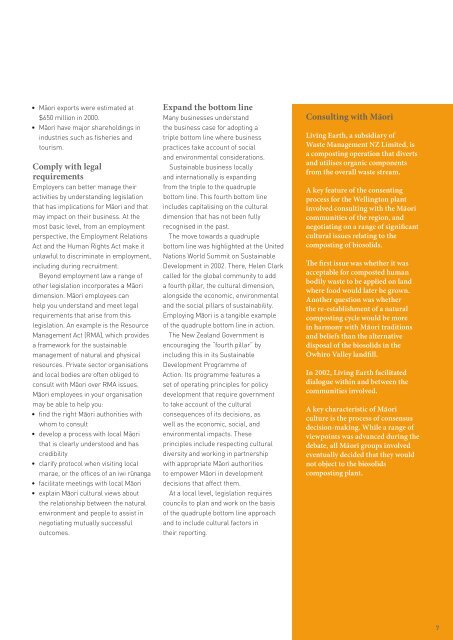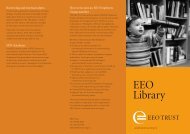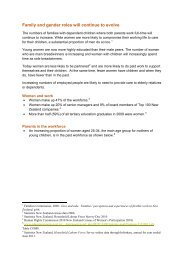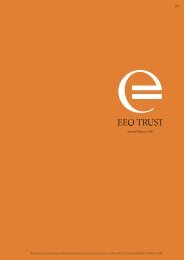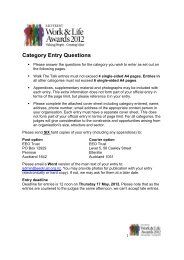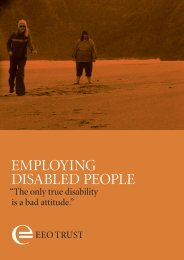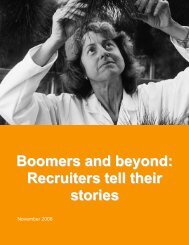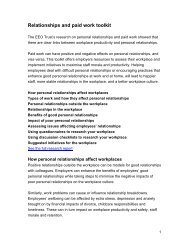Making a Difference - Equal Employment Opportunities Trust
Making a Difference - Equal Employment Opportunities Trust
Making a Difference - Equal Employment Opportunities Trust
- No tags were found...
You also want an ePaper? Increase the reach of your titles
YUMPU automatically turns print PDFs into web optimized ePapers that Google loves.
• Māori exports were estimated at$650 million in 2000.• Māori have major shareholdings inindustries such as fisheries andtourism.Comply with legalrequirementsEmployers can better manage theiractivities by understanding legislationthat has implications for Māori and thatmay impact on their business. At themost basic level, from an employmentperspective, the <strong>Employment</strong> RelationsAct and the Human Rights Act make itunlawful to discriminate in employment,including during recruitment.Beyond employment law a range ofother legislation incorporates a Māoridimension. Māori employees canhelp you understand and meet legalrequirements that arise from thislegislation. An example is the ResourceManagement Act (RMA), which providesa framework for the sustainablemanagement of natural and physicalresources. Private sector organisationsand local bodies are often obliged toconsult with Māori over RMA issues.Māori employees in your organisationmay be able to help you:• find the right Māori authorities withwhom to consult• develop a process with local Māorithat is clearly understood and hascredibility• clarify protocol when visiting localmarae, or the offices of an iwi rūnanga• facilitate meetings with local Māori• explain Māori cultural views aboutthe relationship between the naturalenvironment and people to assist innegotiating mutually successfuloutcomes.Expand the bottom lineMany businesses understandthe business case for adopting atriple bottom line where businesspractices take account of socialand environmental considerations.Sustainable business locallyand internationally is expandingfrom the triple to the quadruplebottom line. This fourth bottom lineincludes capitalising on the culturaldimension that has not been fullyrecognised in the past.The move towards a quadruplebottom line was highlighted at the UnitedNations World Summit on SustainableDevelopment in 2002. There, Helen Clarkcalled for the global community to adda fourth pillar, the cultural dimension,alongside the economic, environmentaland the social pillars of sustainability.Employing Māori is a tangible exampleof the quadruple bottom line in action.The New Zealand Government isencouraging the “fourth pillar” byincluding this in its SustainableDevelopment Programme ofAction. Its programme features aset of operating principles for policydevelopment that require governmentto take account of the culturalconsequences of its decisions, aswell as the economic, social, andenvironmental impacts. Theseprinciples include respecting culturaldiversity and working in partnershipwith appropriate Māori authoritiesto empower Māori in developmentdecisions that affect them.At a local level, legislation requirescouncils to plan and work on the basisof the quadruple bottom line approachand to include cultural factors intheir reporting.Consulting with MāoriLiving Earth, a subsidiary ofWaste Management NZ Limited, isa composting operation that divertsand utilises organic componentsfrom the overall waste stream.A key feature of the consentingprocess for the Wellington plantinvolved consulting with the Māoricommunities of the region, andnegotiating on a range of significantcultural issues relating to thecomposting of biosolids.The first issue was whether it wasacceptable for composted humanbodily waste to be applied on landwhere food would later be grown.Another question was whetherthe re-establishment of a naturalcomposting cycle would be morein harmony with Māori traditionsand beliefs than the alternativedisposal of the biosolids in theOwhiro Valley landfill.In 2002, Living Earth facilitateddialogue within and between thecommunities involved.A key characteristic of Māoriculture is the process of consensusdecision-making. While a range ofviewpoints was advanced during thedebate, all Māori groups involvedeventually decided that they wouldnot object to the biosolidscomposting plant.


